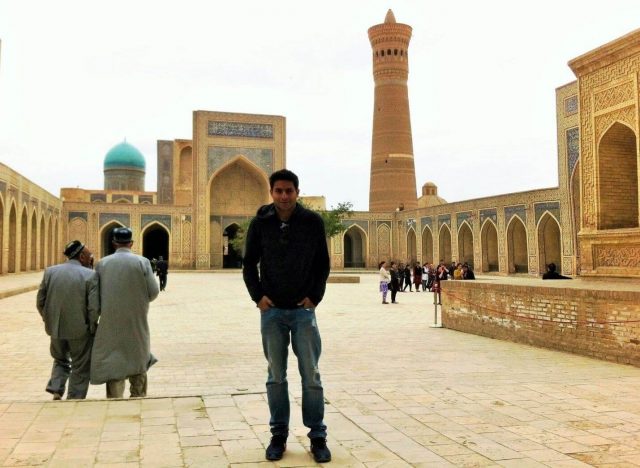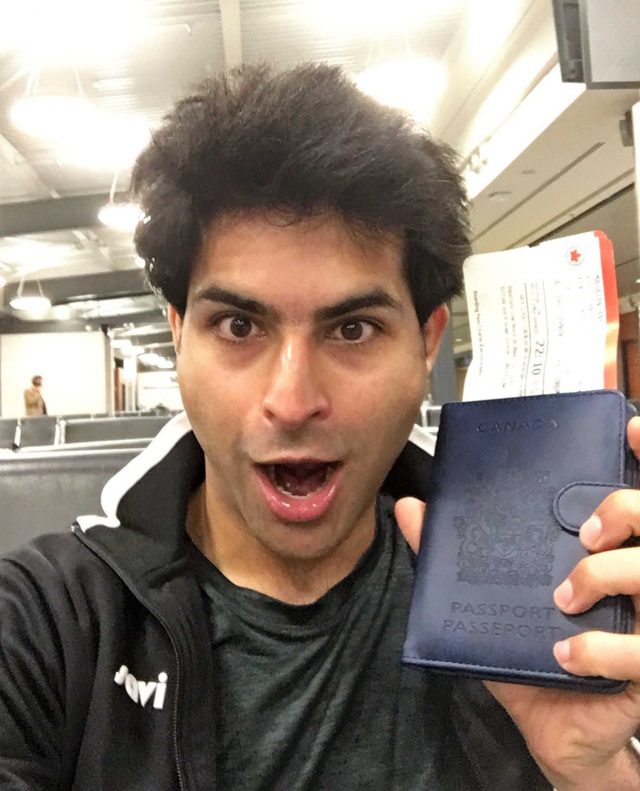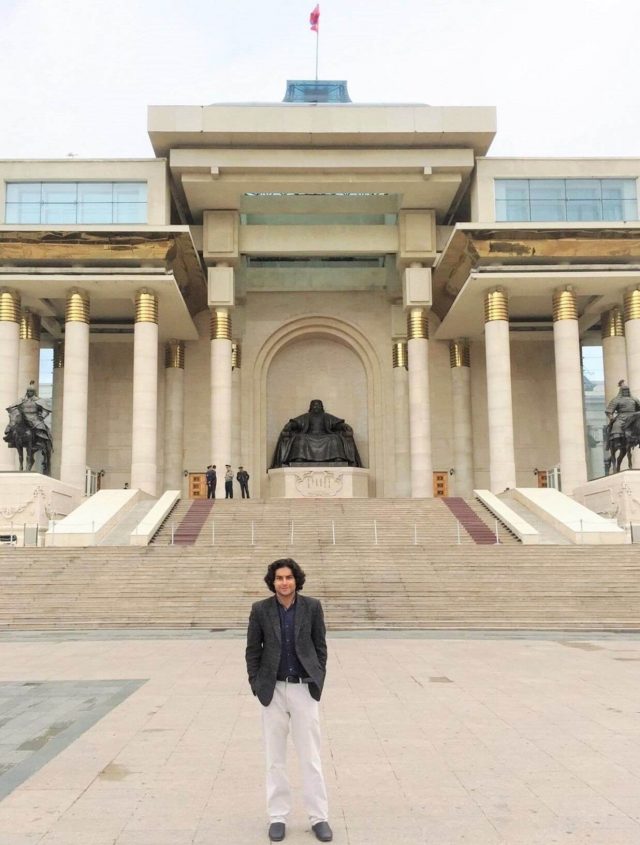By Ankur Mahajan
The objective is to use project management methods and skills to make a success of your solo travels! To inspire the would-be traveler to be bold and adventurous, to take the road less traveled, to confront their prejudices and preconceived ideas, and not to heavily depend on media bubbles about places most people are familiar with.
He draws a parallel between managing a project and planning and executing a trip, stressing the importance of planning adequately, considering constraints, risks and logistics, and making wise decisions. He describes the advantages of solo travel and the skills acquired – skills that will be of benefit in any sphere of life.

Just imagine… My flight was delayed by 7 hours, and I arrived at 10 p.m. in a foreign country where I knew no one. My phone battery was completely dead, and I had to take an expensive taxi to reach my Airbnb, only to discover that the host had already canceled my stay while I was in the air. I was stranded in a foreign country at midnight with no phone battery, foreign currency, or language skills.
This is not a scene from a horror movie or even from a romantic movie where the woman of my dreams steps to my rescue, setting off a chain of events. Nope, it was my actual experience on a trip to Turkey. There was no beautiful woman to giggle at my predicament or a mass murderer lurking in the shadows. However, there was a very expensive hotel located around the corner where I had to spend the night before thankfully being able to find a much more affordable option the next day.
Now, let’s say that the same delay occurred on a trip to Cambodia, but this time, I utilized my project management skills to plan for any problem that might come my way. Remembering what had happened on my trip to Turkey, I carried a power bank for my phone to charge it as I reached the airport.
I emailed my host to confirm my reservation, and when I did not get a suitable response, I chose alternative accommodation from the list of affordable hotels and hostels that I had prepared in case this situation arose.
I made a last-minute reservation and received a booking confirmation, and I left the airport only after I knew that I had a place to spend the night. At the airport, I exchanged some of my money for a few local currency notes just in case I needed cash, bought a local SIM card, and then ordered an Uber to take me to my accommodation.
Project management skills and solo travel – the perfect combination
That is how project management skills can turn what could have been a disastrous start to a journey into a far more manageable hiccup.
One of my favorite quotes is from Albert Einstein: “The more I learn, the more I realize how much I don’t know.” Einstein may have been talking about physics, but that holds true for solo travel, too. There is no better way to learn than to throw oneself into an unfamiliar world.
For many people, unfamiliarity whets the hunger for curiosity, spurs a quest for knowledge, and is an invitation to enter an exciting—sometimes frightening—labyrinth. To live to tell the tale, you must be good at planning, executing your plans, monitoring your progress, and finally evaluating your success. And voilà! You have all the stages of project management.
Project management is a methodology for achieving goals effectively and efficiently within the constraints of time and budget. A project manager is responsible for getting tasks done and is an overall in-charge person. A good project manager is a master in the art of succeeding in a stage-by-stage scenario, thanks to their excellent management skills.
But what does having “management skills” actually mean when you are alone in unfamiliar surroundings? How can these skills help you navigate the challenging world of solo travel?
So let’s jump into the scary world of solo travel
Solo travel is a single person’s quest to explore the unknown—an experience that belongs to you, and only you. Whether you realize it or not, a successful solo journey will utilize and enhance project management skills that you may not even know that you have. In many ways, solo travel can be the ultimate test of your organizational skills.
When you stop to think about everything that goes into solo travel and the various things that you need to consider at every stage of the journey, it becomes apparent that the two pursuits go hand in hand.
You could even say that one must be a good project manager to be successful at solo travel. Without utilizing these skills, you might end up in the same position that I did on my trip to Turkey.
Developing your project management skills through solo travel
Project management theory has developed quite a bit in recent decades, and no wonder; it is relevant to every occupation, from finance and medicine to engineering and tourism. All good project managers possess good organizational skills, and what better way to gain those skills than to jump into the potentially scary world of solo travel.
I strongly believe that my project management skills have aided me in navigating some difficult and tricky circumstances while traveling. Simultaneously, the skills I acquired while traveling have been immensely advantageous in my project management profession.
Like solo travelers who are responsible for organizing every aspect of their trip, project managers have the main responsibility for planning, executing, evaluating, and closing projects, and as they gain more experience, they get better at their job.
Similarly, the more solo trips you take, the better you get at doing what’s necessary to keep yourself safe and the trips interesting. As the “project manager” of a solo travel project, you must balance parameters such as budgetary and time constraints and the different sites that you want to see.
Just like a project manager, the solo traveler must break down their journey into phases if they want the entire project to be successful. Every project goes through a project cycle, which could be compared to planning a solo trip. Just as a successful project should go through all the phases of a project cycle, every solo trip that a person takes should follow the same phases and remain within the constraints of their time and budget.
To really get an idea of how project management skills and solo travel skills are comparable and complementary, let’s break down a solo travel project and compare its phases to those of a typical business or engineering project.
Stage 1 – Project Charter
This is the very first step when the project is born. In many ways, it is similar to the travel bug biting you. In this first step to any project, the project charter, which is the official document that describes the official start of the project, is launched.
While solo travel normally doesn’t include writing an official document, an unofficial start could be telling friends or family that you are interested in traveling to a particular place or that you are planning a solo vacation.
In a typical business or engineering project, the project manager would run a feasibility study during this stage. This involves various tasks usually identified as due diligence, in which the project manager assesses the probability of success and assigns a team to carry out the project.
In the world of solo travel, this is when you decide the destination, review the political situation(s) of the country/countries you plan to visit, and evaluate the feasibility of traveling to them. You do this by following various media sources and reading the reviews of your destination that previous travelers have written.
During this stage, you need to concentrate on the big picture and not let outlying opinions influence you too much. Many negative reviews of your destination shouldn’t necessarily lead you to change your mind but should rather prompt you to look deeper and analyze the situation further.
After deciding the destination and time length, the project charter could be your first concrete step in making this trip a reality. This includes booking your plane ticket or applying for a visa (if necessary).
It could also be putting in a leave request with your employer. It is any document that confirms the start of the trip, meaning a green light to go ahead with the next steps. At this point, you will probably feel yourself starting to get excited, and your adrenalin may even kick in!
Projects often become “official” with a kick-off meeting where the manager shares all the vital information about the project with the other stakeholders and makes sure that everyone is on board. In solo travel, this could be comparable to telling your loved ones the exact dates that you will be gone and arranging for any support that you may need to make your trip a success.
Stage 2 – Planning
During this stage, a typical project manager assesses the roadmap of the project from pre-planning and meets with stakeholders to research, draft, schedule, and receive final approval. This is comparable to solo travelers deciding other trip details after the initial confirmation.
Unlike a project manager who may have an entire team supporting them, in solo travel, you are responsible for finalizing all the macro-level necessities—transportation, accommodations, travel documents, etc.
Remember that each country (and airline, rental car company, etc.) may have unique (and constantly changing) requirements for transit or visits because of COVID, so you must research those requirements and keep up to date with them as your departure date nears and your plans materialize.
Trust me, the last thing you want to do is show up at an airport and not be allowed to board the flight because of a Covid restriction you didn’t even know existed.
At this stage, you start considering the micro-level details about your trip, such as which cities to visit, developing a further understanding of the financial expenses, short-listing the landmarks to see, and deciding what you will need to take with you. This forms the skeleton of your journey, also known as the work plan in project management.
Deciding your objectives
In business and engineering, this is the stage when the project manager, along with the team, decides on the high-level objectives and other measurable goals for the project. Similarly, a solo traveler must have a clear idea of the kind of journey they will be taking.
This is when you compare the length of your stay with the funds you have and figure out how you will balance the amount of time that you have to travel with the amount of funding you have set aside for it.
From the time you decide to book your dates to when you’re back in the comfort of your home, you are the sole decision-maker. Maybe you’ll find terrific deals online or maybe your mileage points will come in handy—the triumph is yours alone.
Create a financial plan
During this stage, the project manager digs deep into the small details of the project as a way to avoid surprises later that could have a major impact on the time and budget allocated for the project.
Similarly, the solo traveler checks on the costs of accommodation and transportation in the places that they are traveling to. They may even need to find alternative travel dates for select activities or destinations.
A successful project manager should always have a contingency fund in case of any unexpected expenses incurred. Likewise, the solo traveler should have emergency funds in a few different bank accounts, just in case they are unable to get money from one account.
At this stage, it is also important that the solo traveler contacts their bank to let them know that they will be traveling and checks on what the current currency exchange rate is. They may also want to check on what the fee is for using ATMs abroad and whether there are any other costs they should be aware of.
Create a logistical checklist
Along with making sure that your finances are in order, there are plenty of other things to consider before starting your journey. It is helpful to keep a little checklist on hand, just as you would when managing a project.
Travel insurance and medical considerations
Does your current medical insurance cover you when you are traveling overseas? If not, do you have a comprehensive policy that will cover you in the event of an emergency? Will it also cover medical evacuations, loss of property, and theft?
Do you have enough prescription medication to cover your entire trip?
Do you know what to do if you have a medical emergency while you are traveling in a particular country or destination?
Logistics
Will your phone work while you are abroad? What will the roaming charges be? Is it better to get a local SIM on arrival?
Is there Uber or another ride-hailing service available at your destination? How much does a taxi cost to get from the airport to your accommodation?
What is the layout of the city that you are visiting? Are things close together? Can you walk between destinations? What about public transportation? Is it safe? Do you need to rent a car? Is there parking?
What should you pack? Is the climate hot or cold? Is it a conservative or relatively liberal country? How should you dress in order to not stand out amongst the local population?
What percentage of the local population speaks English? How can you prepare yourself for possible communication issues?
Do you have a Plan B in case things don’t work out exactly as planned? What happens if you fail a Covid test and need to quarantine somewhere?
Safety issues
Are there any particular safety concerns that you should be aware of? What are the common scams that happen in the country or city? Is it safe to walk around late at night? Should you carry your passport with you?
All these demanding details are part of the planning process.
Maximize output by utilizing your project management “toolbox”
To simplify the extensive planning process, the project manager in this stage uses one of the most common techniques called the critical path. It is a tool to best schedule all jobs in the project to meet a target date. This helps them to know which activities can run simultaneously without disrupting the schedule.
A solo traveler knows that bureaucratic paperwork such as visas, insurance, booking pre-departure covid tests, etc. can take a long time, so they schedule it early in the process. Similarly, they plan activities and a list of places to visit according to the opening hours and schedule other activities when they are feasible.
Like a project manager who wants to maximize output by reducing costs and focusing on time management, a solo traveler plans in a way to be able to do as much as possible in a limited amount of time.
Another tool utilized by the project manager is a breakdown structure where every activity is further divided into manageable aspects. Hiking to see a sunrise at 5 a.m. would involve setting an alarm clock, selecting warm clothes to wear, planning an early breakfast or items to take with you, and arranging transport to where you’ll be starting the hike.
All these bigger activities can be well-managed through a work breakdown structure to successfully achieve a milestone.
This can be a daunting and overwhelming stage for many people considering solo travel and is a major reason that people shy away from traveling alone. While it may seem as though there are too many things that can go wrong or there is way too much to remember, this is one of the most important stages when it comes to personal development.
It will test your organizational, creative thinking, and analytical skills that you will be able to relate to other aspects of life. It’s also a stage that will define the future success of your upcoming journey.

Stage 3 – Project Execution
This is the stage where plans turn into reality. Project execution means finally putting everything into action.
Imagine this… You have done your planning and are excited about the day that you will finally leave on your solo adventure. Now, similar to how a project manager commences the execution of the project, you pack your suitcase(s) and head over to the airport, bus, or train station. You check-in and wait to depart. You message your family or friends to tell them that you are sitting at the gate and maybe post on social media about your new adventure.
The trip is long and boring, and you struggle to get comfortable in your tiny seat. You anxiously look through the inflight magazine and watch the flight map to see how much longer you have until you arrive. Finally, after what feels like a million years, you touch down and walk off the plane.
You get to immigration and hear what seem to be the most common questions around the world: Are you traveling by yourself? What are you doing here? How long will you stay? Just as years of working in project management will make you better at it, years of solo traveling will give you confidence about answering the immigration officer’s questions, and you will be on your way.
This is the stage where all the efficiency of your planning will be tested. If you planned well, you will have a picture in your head of your baggage so you will be able to recognize it in the sea of other baggage.
If you planned well, you will know exactly what you need to do to get to your accommodation. Unless the circumstances have changed due to flight delays, transit strikes, etc., you will stick to your plan of commuting from the airport/station to your residence.
Being solo generally makes people more likely to use public transport, since taxis are more economical for groups. One can explore the local aspects of a city far better by public transport than by simply jumping into a car.
Sometimes, things don’t go exactly as planned and you may need to find an alternative way to get to your hotel. This is similar to how a project manager will analyze the situation if a project deliverable is delayed and take corrective measures if needed.
Embrace your role as a key decision-maker
Since you are the project manager and, in most cases, the sponsor of your solo trip, it is important to remember that you get the last word and can decide exactly what works best for you. Simply put, you can do whatever makes you happy.
A good project manager identifies a certain variable that is beneficial for the project during the execution stage and will try to maximize it. Similarly, solo travelers can do whatever they want to make the journey better for them.
This may mean that they choose to dine in the same places every day or try some of the local dishes, such as coxinha in Brazil, fufu in Burkina Faso, insects in Myanmar, or samsa in Uzbekistan. Who knows? If you like it, you can jump off your agenda and have it every day of your travels without having to worry about anyone else’s approval. Being a solo traveler makes you the decision-maker.
If you are used to traveling with other people, this may be a difficult step for you. You may even find yourself wondering whether anyone at home will be questioning your choices if you decide not to go to a world-famous museum or try the destination’s local cuisine.
However, you must remember that solo travel is the chance for you to be in full control and this is the time to embrace this sense of independence and empowerment.
It is also important to remember that as the key decision-maker, you have the opportunity to adjust your budget as necessary. During a project, the project manager may have some leverage to increase or decrease the budget on certain deliverables.
Solo travelers, too, can often increase their budget or cut costs as they see fit, whether it means splashing out on that cute boutique hotel or spending the night in a dorm room to save some money. Just as a project manager has the power to make financial decisions during a project, a solo traveler has the liberty to make decisions on how to spend their travel funds.
Focus on the key objectives of the project
Knowing what your objectives are is an incredibly important aspect of project management. Likewise, when you are traveling solo, you should have a list of items that you want to see or do. However, this shouldn’t be restricted to just the sights that you want to visit or the different restaurants that you want to try. Instead, these should be seen as more of a checklist that helps you achieve something greater—developing an understanding of the destination you have visited.
The long-term gains of solo travel are much broader than being able to say that you have visited X, Y, and Z. However, there are certain actions that must be taken during your journey to ensure that you are successful.
Understanding cultural differences
Throughout a project, project managers learn a lot about the project culture and the stakeholders involved. Similarly, while executing your travel agenda as a solo traveler, you are constantly learning about the world around you.
Culture shock may impact you more deeply, since being immersed in the local culture completely on your own can make you hyper-aware of everything happening around you. This is generally for two reasons.
One, you have to be more aware of your surroundings when you are by yourself if you want to travel safely, and two, you don’t have as many distractions that keep you from observing what is happening around you.
As you walk alone on unfamiliar streets, your mind tries to absorb everything that you see and your senses come alive. You will not only hear the language and accents but also smell the local cuisine.
As you spend more time absorbing everything around you, you will likely begin comparing what you are seeing to your own home or other places that you have traveled to. You will search for similarities and make a mental record of the things that you find different. You may even notice things that you have never thought about before!
For instance, in certain religious countries of the Middle East and East Asia, you may not see many couples showing physical affection in the streets, whereas you may see plenty of couples hugging and kissing in Brazil.
Holding hands in African and South Asian nations might be the norm between people of the same sex, but in North America and Europe, it’s seen as an indication of an intimate relationship. You may never have thought about how people show affection in your own country because for you it just feels “normal.”
Suddenly, you may find yourself paying more attention to interpersonal relationships in your new destination and start looking at the culture from an even broader perspective.
Be ready for anything
A good project manager will try to prepare themselves for a variety of unexpected events but will still have surprises throughout the execution stage of the project. Similarly, a solo traveler can prepare beforehand, but until they personally face a situation, they will not completely comprehend the circumstances they may find themselves in.
They might have heard or read about unexpected things (both good and bad) that have happened to fellow travelers and just shrugged them off.
For instance, before you travel to a destination, you may hear stories about how someone was asked to appear in photos or even excitedly welcomed into a stranger’s home simply because of their race or other physical characteristics.
While it may be a bit alarming at first, a solo traveler will often experience people staring at them and asking questions. This is usually not meant aggressively, and it usually just stems from curiosity. While you may read about this or hear stories from other travelers, when you are actually confronted with a situation, you will be able to understand it more clearly.
Learn to adapt
A project manager is versatile and can prepare for a project using theory concepts such as a fishbone diagram or Gantt chart, but it is only once the project has begun and they start interacting with stakeholders that they learn about the local culture. With experience, they will get better at managing and achieving milestones.
Equivalently, solo travelers can read books and watch YouTube videos about cultural differences, but only personal experience and interactions can bring these differences to life. The more you travel and interact with the local population, the more you will understand and adapt to different situations.
Learning to adapt to a new environment is a critical step to ensuring that you are truly able to immerse yourself in what you are experiencing rather than simply viewing it through the eyes of an outsider.
Throughout a project, the project manager recognizes the bureaucracy involved in getting things done and has the patience to achieve results. Similarly, a solo traveler must realize that services might not be rendered with the efficiency they are used to, and they shouldn’t expect everything to be like home.
Initially, many inexperienced travelers are a bit hesitant about communicating with the local population. While it can sometimes be difficult to make yourself understood, this isn’t always a negative aspect of travel.
Traveling solo will give you more opportunities to meet the locals than traveling with another person or a group, and it will also give you the chance to enhance your communication skills as you adapt to situations and engage in culturally appropriate conversations.

Ethics and solo travel
Ethics and empathy are a massive part of being a good project manager, and this becomes most apparent during the execution stage as most of the vital decisions are taken at this time. Without ethics and empathy, a project will not achieve its objective successfully.
The more in tune the project manager is with the needs of their team and the client, and the more effort they put into understanding those needs, the greater the chance the project will be successful. A project manager must have a sense of responsibility, respect, fairness, and honesty.
The project manager’s job isn’t just to manage the project. It is about making the best decisions for the team, the community, and the objective of the project, especially when considering the impact it can have on the resources and the environment.
Like a good project manager who cares about their community and the effects of the project on the environment, a solo traveler has a responsibility to support small businesses that have been struggling to survive, instead of simply giving more money to big international corporations.
This may mean anything from paying a little bit more for a bottle of water at a mom-and-pop shop rather than heading to the local supermarket, or staying at a locally-owned hotel rather than the International chains of hotels. While the long-term impact on the solo traveler might be limited, it could make a huge difference to the local population.
The solo traveler should also conduct themselves well and treat others with respect, as they are not traveling merely as an individual but are representing their race, nationality, and culture.
A solo traveler will be more accepted and have a more satisfying experience if they show empathy towards others. And they must obey the laws of the country, even when they see instances of corruption. The solo traveler should be the ideal tourist that every country appreciates and leave a good impression of their ethical behavior.

Read More: In Pics: What Are These Snow Monsters Or Juhyos Of Japan?
Stage 4 – Project monitoring and control
This stage of project management focuses on monitoring time frames, budgetary spending, and milestones. For solo travelers, this means completing everything on your itinerary within your budget and time constraints.
During this phase of project management, it is imperative that project managers communicate clearly and regularly with all the stakeholders to monitor the project. In other words, they must continuously evaluate the process to ensure their milestones are completed timeously.
Likewise, the solo traveler ensures that their destination to-do list is progressing within the timeframe and within the allocated budget. Trust me, you don’t want to wake up on the last day of your vacation and realize that you have a long list of places you still want to see and no money left.
Identify and mitigate risks
No matter how well-prepared a project manager is or how well they manage timelines, budgets, and so on, there is always some level of risk involved in any project. The risk strategy in place can decide the success or failure of the project.
When a project faces a risk, the project manager assesses the risk to make a decision that is most suited to the progress of the project and needs to make strong judgments on whether to utilize the strategy of avoidance, retention, sharing, transferring, or reduction of risks.
Risk management is a skill that we all subconsciously utilize every day of our lives, and it is heightened when we are in unfamiliar situations. Since this is often the case when we are traveling alone, risk management skills are frequently put to the test, and you may even find your own skills being strengthened beyond your wildest expectations.
Comparably, a solo traveler must understand that although traveling isn’t inherently risky, there are certain risks involved that you may not encounter at home.
Just as a project manager is able to identify and mitigate risks to keep the project running smoothly, a solo traveler must trust the surroundings, the people, and other variables that they may encounter in order to enjoy the journey.
This doesn’t always come easily when you first travel solo, but you will quickly develop the necessary risk management skills to make your trip a success. You will find yourself learning how to observe your surroundings while immersing yourself in a new culture, identifying what foods are safe to eat, and calculating prices in your head to avoid being overcharged.
While biased media may represent certain people in a particular way and one negative interaction can color an entire vacation, it is important that a solo traveler maintains the belief that the majority of people they will meet during their trip will have genuinely good intentions, while not completely letting down their guard or ignoring their instincts.
Yes, just as a manager needs to take calculated risks to execute and successfully monitor the project, a solo traveler should prepare and take precautions to have a more fulfilling and wholesome experience. However, they should never see everyone in the same light, irrespective of their race, religion, age, or sex.
Handling finances
One of the key tasks of a project manager is to keep an eye on the budget at all times. Likewise, solo travelers need to keep track of their expenses if they are traveling on a tight budget. The solo traveler also subconsciously utilizes the project management tool of forecasting, that is, estimating the required expenses for the remainder of the journey.
Knowing when to call it a day
Even the best project managers may one day realize that their current project is not feasible and they have to decide whether or not they should proceed. This is a very important aspect of risk assessment in solo traveling, as it will allow you to start trusting your intuition and be more bold and willing to say no when faced with red flag situations.
While they are monitoring the success of a project, the project manager is agile, meaning they use different techniques and are dynamic in their judgment. They know that not all plans turn out as expected.
Similarly, the more experience a solo traveler has, the more they will realize that danger can arise in any country or city, whether they are walking in Midtown New York or a favela in Rio de Janeiro.
They may change their plans according to the situation, just as a project manager has various contingency plans in place but continues to execute and monitor the project. Both solo travelers and project managers use agile methodology to prepare themselves for different circumstances that may arise.
Solo traveling can change you in countless ways and develop skills that might help you in the future. It will make you think, it will make you street smart, it will help you make tough decisions. Most importantly, solo travel will teach you what you are capable of, and it will strengthen your overall character.
Procurement
A project manager must also manage the procurement of the products, materials, goods, and services needed for efficient business operations. Likewise, a solo traveler, to have a successful experience, has to be good at shopping for basic requirements, picking a tour operator for a day trip, or even ordering food at a restaurant.
They have to look at different aspects and compare prices to the local standards. In many instances, you also quickly learn about the local negotiation culture and whether it is polite to haggle over prices or not. Otherwise, you may end up paying a lot more than residents for the same meals or services.
Stage 5 – Project closings
During the project closing stage, the project manager determines whether the project was a success or not. This means that they must look back and analyze whether all the processes and plans that were formulated were effective or not.
Was the project goal met within the given budget and timeline? What went well and what didn’t?
Once the solo traveler is back in the comfort of their home, they generally begin the same process. They think back on the trip and process the surprisingly pleasant and unpleasant experiences in their minds.
Just as a project manager reviews all the contract’s documents during the closing, a solo traveler goes through their credit card statements and throws away any of the receipts that they no longer need.
This is the time the traveler does an overall budget analysis and sees the variances from the planned amount. The more experienced a traveler, the smaller the variance between the forecasted amounts and the actual amount spent.
Finally, the project manager, during this process, acknowledges all the stakeholders for their teamwork and collaboration. A good project manager maintains a good rapport with everyone involved in the project and helps guide them every step of the way.
At the closing of the project, the project manager provides them with appreciative messages and useful feedback. A solo traveler often reflects on their experience in the same way and expresses gratitude to all those who assisted them along the way, whether it be the co-worker who watered their plants or the friends who gave them great recommendations on where to go.
This not only shows the traveler’s appreciation but also reflects their values; it has a snowball effect and will lead others to do the same.
Lessons learned
Learning from your experiences
As they are closing the project, the project manager also conducts a thorough post mortem where they record certain lessons learned, as well as opportunities that need to be documented.
During this post mortem, the project manager needs to pay attention to little details that could hamper the progress of future projects. This is a vital process that ensures they do not repeat the same mistakes and all opportunities that can enhance the next project are maximized.
In much the same way, it is a good idea for solo travelers to write down lessons learned from their experiences in a journal or travel blog so they can have more enriching experiences in the future. By taking the time to document the highs and lows of their journey, they are able to reflect on what they would do differently the next time.
Becoming comfortable being alone
Solo travel can either feel lonely or be an excellent experience, depending on your outlook and need for companionship. It’s comparable to playing a team sport or an individual sport; both have their charms.
Nonetheless, it is vital to recognize feelings of loneliness and acknowledge them when these sentiments emerge. During these times of solitude, solo travel can both make you feel grounded and test you.
Sometimes you may even feel that being alone is your greatest strength as it gives you an opportunity to find perspective and to reflect more deeply about life as unfamiliarity surrounds you.
After your first solo trip, you will realize that the anxiety about traveling alone was just a temporary feeling and you will be able to overcome it in the future.
Acknowledging your new skill sets
Solo travel can help you develop important skill sets that you can use in the future. It will hone your organizing skills. It will make you much more conscious of the verbal and nonverbal signs around you.
You will become self-reliant, and while it can force you out of your comfort zone, it will allow you to become more extroverted. When you are alone, you will be forced to make attempts in the local language a lot more. You will also become better at listening and observing.
Just as a project manager realizes that every project is unique, a solo traveler realizes that countries and nationalities are all different. Every human is unique. You will learn to never underestimate anyone’s intelligence, regardless they speak your language or not.
You will also realize people around the world are equally capable and hardworking; the distinction is due to scarcity of opportunities and resources.
Developing cultural awareness and sensitivity
An important quality for a project manager is being able to recognize the intentions and potential of all the stakeholders while being understanding and patient with stakeholders of various cultural backgrounds.
A good project manager remains optimistic during times of adversity. Similarly, a solo traveler should recognize that humans tend to express themselves differently in different cultures and situations. A solo traveler needs to be resilient and not easily offended.
They should appreciate that a negative experience, for example, theft in Latin America or being overcharged in Asia, is not a reflection of the entire culture or nationality. Similarly, people’s aloof manner in some European countries is not intended as rudeness.
Just as a project manager acknowledges that the project team comprises unique individuals with various personalities, a solo traveler will learn that they should not generalize about a culture, religion, or nationality based on individual behavior.
Solo travel will make you feel more accepting toward other cultures and nationalities. You will start identifying with and relating to people of different backgrounds, and as a result, you will generally become more approachable and kind to others. Solo travel will also help you develop empathy for other travelers who are traveling through your country and don’t speak the language.
Looking forward to your next trip
Overall, a good project manager is grateful for the hard work and dedication of their team and feels satisfaction when the project is a success. Similarly, a solo traveler feels fortunate to have had the opportunity to travel and explore the world. Most importantly, they realize that not everyone has the same opportunities.
Over time, the experience of solo travel will also make you calmer and more sensible as you build your confidence and learn how to handle different—and difficult—situations. These are life skills that will stand you in good stead, whether you are managing a project at work, buying your first home, or taking off on an around-the-world adventure.
Author Bio: Ankur Mahajan is a Canadian Federal Government employee, solo traveler, certified project manager, judoka, runner, and author of a published book, “Life Beyond Bullets.”
Image Credits: Ankur Mahajan
This post is tagged under: Ankur Mahajan, Ankur Mahajan solo travel, solo travel, solo travel tips, project management methods, trip, travel, travelling, solo traveller, solo travel ethics, cultural differences, Travel insurance, Project management skills solo travel
Disclaimer: We do not hold any right, copyright over any of the images used, these have been taken from Google. In case of credits or removal, the owner may kindly mail us.
Other Recommendations:
6 Unconventional Indian Monuments That Deserve To Be On Your Bucket List


































